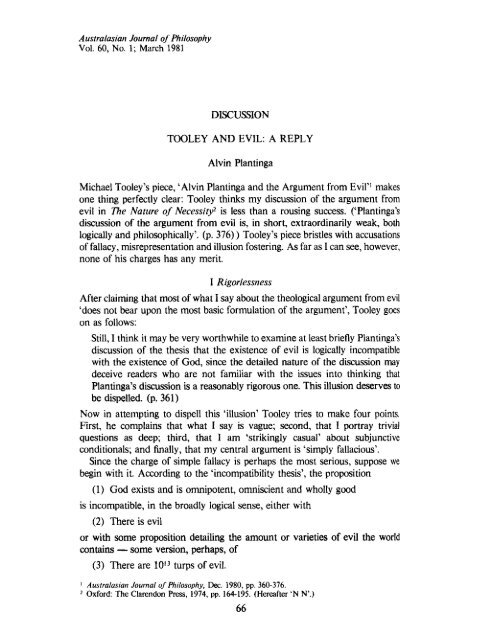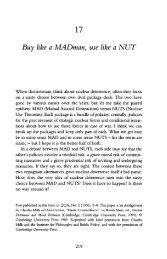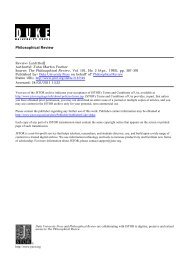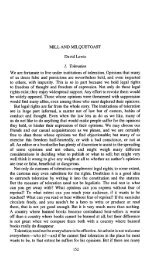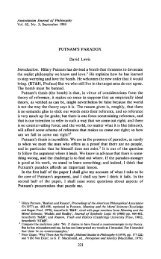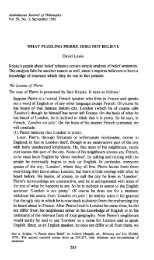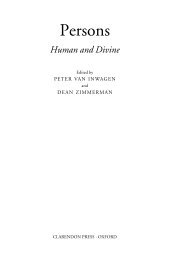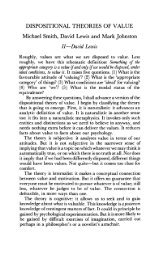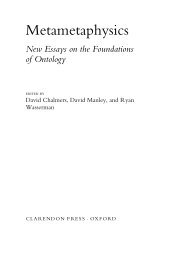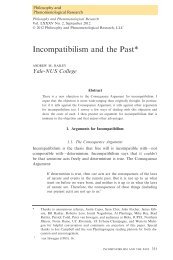Tooley and Evil - Andrew M. Bailey
Tooley and Evil - Andrew M. Bailey
Tooley and Evil - Andrew M. Bailey
- No tags were found...
You also want an ePaper? Increase the reach of your titles
YUMPU automatically turns print PDFs into web optimized ePapers that Google loves.
Australasian Journal of PhilosophyVol. 60, No. 1; March 1981DISCUSSIONTOOLEY AND EVIL: A REPLYAlvin PlantingaDownloaded by [University of Notre Dame] at 11:51 14 April 2012Michael <strong>Tooley</strong>'s piece, 'Alvin Plantinga <strong>and</strong> the Argument from <strong>Evil</strong> '1 makesone thing perfectly clear: <strong>Tooley</strong> thinks my discussion of the argument fromevil in The Nature of Necessity 2 is less than a rousing success. ('Plantinga'sdiscussion of the argument from evil is, in short, extraordinarily weak, bothlogically <strong>and</strong> philosophically'. (p. 376) ) <strong>Tooley</strong>'s piece bristles with accusationsof fallacy, misrepresentation <strong>and</strong> illusion fostering. As far as I can see, however,none of his charges has any merit.I RigorlessnessAfter claiming that most of what I say about the theological argument from evil'does not bear upon the most basic formulation of the argument', <strong>Tooley</strong> goeson as follows:Still, I think it may be very worthwhile to examine at least briefly Plantinga'sdiscussion of the thesis that the existence of evil is logically incompatiblewith the existence of God, since the detailed nature of the discussion maydeceive readers who are not familiar with the issues into thinking thatPlantinga's discussion is a reasonably rigorous one. This illusion deserves tobe dispelled. (p. 361)Now in attempting to dispell this 'illusion' <strong>Tooley</strong> tries to make four points.First, he complains that what I say is vague; second, that I portray trivialquestions as deep; third, that I am 'strikingly casual' about subjunctiveconditionals; <strong>and</strong> finally, that my central argument is 'simply fallacious'.Since the charge of simple fallacy is perhaps the most serious, suppose webegin with it. According to the 'incompatibility thesis', the proposition(1) God exists <strong>and</strong> is omnipotent, omniscient <strong>and</strong> wholly goodis incompatible, in the broadly logical sense, either with(2) There is evilor with some proposition detailing the amount or varieties of evil the worldcontains -- some version, perhaps, of(3) There are 10 t3 turps of evil.Australasian Journal of Philosophy, Dec. 1980, pp. 360-376.2 Oxford: The Clarendon Press, 1974, pp. 164-195. (Hereafter 'N N'.)66
Downloaded by [University of Notre Dame] at 11:51 14 April 2012Alvin Plantinga 67I argued that this claim is false. Central to the main line of argument was asubsidiary argument for the conclusion that even if God is omnipotent, thereare many possible worlds he could not have actualised, either weakly orstrongly. According to <strong>Tooley</strong>, however, this argument needs more work:'Plantinga's discussion of the incompatibility thesis is, in short, extremelyunsatisfactory in a number of respects, <strong>and</strong> the central argument upon whicheverything rests, is simply fallacious'. (p. 366) This is a repetition of what hesays earlier on the same page: 'Platinga's argument here is simply fallacious'.The same charge is to be found in <strong>Tooley</strong>'s bilious review of The Nature ofNecessity: 'His attempt to prove that it was not within God'spower to actualisejust any possible world that includes his existence is simply fallacious. '3Now these are strong words; how does <strong>Tooley</strong> back them up? With a mereconfusion. My argument went as follows. First, I distinguished what God couldhave strongly actualised from what he could have weakly actualised: God couldhave strongly actualised a state of affairs S if <strong>and</strong> only if he could have caused Sto be actual; <strong>and</strong> God could have weakly actualised S if <strong>and</strong> only if there is astate of affairs S* such that (a) God could have strongly actualised S*, <strong>and</strong> (b)if he had strongly actualised S*, then S would have been actual. My aim was toshow that there are possible worlds God could not have actualised, eitherweakly or strongly.I argued as follows. Let's suppose that Curley Smith, the mayor of Boston,has in fact been offered a bribe of $35,000 to take some improper action; <strong>and</strong>let's suppose further that he has accepted the bribe. We may speculate as towhat Curley would have done had he instead been offered a bribe of $20,000 toperform that same improper action. Clearly there are possible worlds in which(a) God strongly actualises (among others) the state of affairs consisting inCurley's being offered a bribe of $20,000 <strong>and</strong> Curley's being free with respect tothe action of taking the bribe, <strong>and</strong> in which (b) Curley freely accepts the bribe.Now let W be any such world, <strong>and</strong> let T be the largest state of affairs Godstrongly actualises in W; that is, God strongly actualises Tin W<strong>and</strong> Tincludesevery state of affairs God strongly actualises in W. I argued (p. 181) that thereare other possible worlds in which God strongly actualises the very same statesof affairs as he does in W, <strong>and</strong> in which Curley rejects the bribe; let W* be anysuch world. In W* God strongly actualises the very same states of affairs as hedoes in W; hence T, the largest state of affairs God strongly actualises in I41, isalso the largest state of affairs he strongly actualises in W*. W*, therefore,includes God's strongly actualising T. I then assumed that eitheror(4) If God had strongly actualised Curley's being offered the bribe <strong>and</strong>being free to accept or reject it, then Curley would have accepted it(5) If God had strongly actualised Curley's being offered the bribe <strong>and</strong>being free to accept or reject it, then Curley would not have accepted itis true. I went on to argue that if (4) is true, then so is3 Australasian Journal of Philosophy, May 1977, p. 102.
Downloaded by [University of Notre Dame] at 11:51 14 April 201268 <strong>Tooley</strong> <strong>and</strong> <strong>Evil</strong>: A Reply(6) If God has strongly actualised T, then Curley would have accepted thebribe;<strong>and</strong> if (5) is true, then so is(7) If God had strongly actualised T then Curley would not have acceptedthe bribe.I then argued for two theses:(8) If (6) is true, then God could not have weakly actualised W* (that is, if(6) is true, then there is no state of affairs C such that God could havestrongly actualised C <strong>and</strong> such that if he had strongly actualised C, thenW* would have been actual), <strong>and</strong>(9) If (7) is true, then God could not have weakly actualised W.(The argument for (8) <strong>and</strong> (9) is to be found on pp. 181-182). Accordingly, if(6) is true, then God could not have weakly actualised W*; if (7) is true, hecould not have weakly actualised W; so either way there is at least one possibleworld God could not have weakly actualised. Furthermore, since strongactualisation is a special case of weak actualisation, it follows that there arepossible worlds God could not have actualised, either weakly or strongly.Now <strong>Tooley</strong> objects as follows:Plantinga's argument here is simply fallacious. For suppose that it is true thatif God had strongly actualised T, then Curley would have accepted the bribe.How does it follow that God could not actualise W*? The answer is that itdoes not follow, since none of the premises rule out the possibility that whileGod can strongly actualise T, he can also weakly actualise Twithout stronglyactualising it. And it may be the case that if God were to (merely) weaklyactualise T, then Curley would reject the bribe. So the premises do no!preclude the possibility that God can bring about W by strongly actualisingT, <strong>and</strong> W* by weakly actualising, but not strongly actualising, T. (p. 367)It isn't easy to take this objection seriously. <strong>Tooley</strong> claims that perhaps Godcould have weakly actualised W* by weakly actualising T but not stronglyactualising it. But what I argued was that there are possible worlds in which Godactualises the very same states of affairs as he does in IV, <strong>and</strong> in which Curleydoes not take the bribe; <strong>and</strong> I proposed to let' W*' denote any such world. Byhypothesis, then, W* is one of the possible worlds in which God stronglyactualises the very same states of affairs as he does in IV. T (by hypothesis) isthe largest state of affairs God strongly actualises in W; it is therefore one of thestates of affairs he does strongly actualise in IV, <strong>and</strong> hence is one of the states ofaffairs he strongly actualises in W*. By hypothesis, therefore, W* includesGod's strongly actualising T. But then to suggest that God could perhapsweakly actualise W by weakly but not strongly actualising T is to fall intoegregious confusion; any world in which God does not strongly actualise T isnot W*. One way for God to ensure that W* is not actual is to refrain fromstrongly actualising T.
Alvin Plantinga 69Let me restate the main point here. I argued (p. 181) that God's stronglyactualising T (the largest state of affairs he strongly actualises in W) doesn'tinclude or entail Curley's taking the bribe; I then went on as follows:So there is another possible world W* where God actualises the very samestates of affairs as he does in W, <strong>and</strong> in which Curley rejec~the bribe. W*therefore includes GT [God's strongly actualising T] <strong>and</strong> A [Curley's notaccepting the bribe]. That is, in W* God s~ongly actualises Tbut no state ofaffairs properly including T; <strong>and</strong> in W* A holds. And now it is easy to seethat God could not have actualized this world W*. (p. 181)Downloaded by [University of Notre Dame] at 11:51 14 April 2012By hypothesis, then, W* is one of the worlds that includes God's stronglyactualising T; any world in which God does not strongly actualise Tis not W*.So how can <strong>Tooley</strong> be serious in claiming that 'the premisses do not precludethe possibility that God can bring about... W* by weakly actualising, but notstrongly actualising, T'?In the next paragraph, <strong>Tooley</strong> perpetrates another version of the samemisunderst<strong>and</strong>ing:Plantinga goes on to offer a less informal <strong>and</strong> more explicit statement of hisargument here. But it suffers from precisely the same flaw, since it involvesan inference which rests upon the assumption that 'W* includes GT'(p. 812) -- where 'GT' means the same as 'God strongly actualises T.' Thepossibility that God might actualise W* by weakly actualising Tis once againoverlooked.But of course that W* includes GTis not an assumption. I argued that there arepossible worlds that include GT <strong>and</strong> in which Curley rejects the bribe; Iproposed to let the variable' W*' denote any such world. It is therefore a pieceof sheer confusion to criticise this argument for 'resting on the assumption' thatIV* includes GT. Suppose you show that there is at least one prime number p*greater than 109. You begin a subsequent argument by saying 'Now since p* isprime, it is not divisible by 17' <strong>and</strong> go on to infer some conclusion. Would yoube impressed if someone claimed that your argument is simply fallacious,because it rests upon the assumption that p* is prime?So much for <strong>Tooley</strong>'s claim that my main argument is 'simply fallacious'. Hemakes another charge of lack of rigour as follows:Thirdly, subjunctive conditions enter into Plantinga's argument in a crucialway, since he needs to talk about what people would have done if certainthings had been the case. He is strikingly casual, both in his use of suchconditionals, <strong>and</strong> in the assumptions he makes about them. (p. 364)My 'striking casualness', says <strong>Tooley</strong>, comes out in my assuming withoutargument that either(7) If Curley had been offered a bribe of $20,000 he would have acceptedthe bribe
70<strong>Tooley</strong> <strong>and</strong> <strong>Evil</strong>: A ReplyDownloaded by [University of Notre Dame] at 11:51 14 April 2012or(8)If Curley had been offered a bribe of $20,000 he would not haveaccepted the bribe 4is true. Furthermore, he says, this assumption is 'implausible'. Now I don'tthink this assumption is at all implausible. But the important point here -- apoint that seems to have eluded <strong>Tooley</strong>'s attention -- is that the free willdefense, as I stated it, is in no way dependent upon the assumption that either(7) or (8) is true. I gave two versions of the crucial argument m the argumentfor the conclusion that there are possible worlds God could not have weaklyactualised; one of these arguments took as a premiss the disjunction of (7) <strong>and</strong>(8) <strong>and</strong> the other did not. Before giving the first argument, I saidAccordingly, I shall temporarily take it for granted, in what follows, thateither (7) or (8) is true; as we shall see .... this assumption, harmless as it nodoubt is,, can be dispensed with. (p. 180)After giving the argument I said once more that this assumption is dispensible<strong>and</strong> then gave for the same conclusion another argument that dispensed with it.Where is the lack of rigour there?Indeed, so far as rigorlessness goes in this context, the shoe is on the otherfoot. According to <strong>Tooley</strong>,Another reason why it is very difficult to see why one should think theanswer to the question whether the disjunction of (7) <strong>and</strong> (8) is true isaffirmative, let alone obvious, is that neither a consequence analysis ofsubjunctive conditionals nor a possible worlds analysis of the Lewis varietyentails that either (7)is true or (8) is true. A Stalnaker account does havethis consequence, but it does so because it collapses 'would' conditionals <strong>and</strong>'naight' conditionals <strong>and</strong> is implausible for precisely that reason. (p. 364)Wlaat <strong>Tooley</strong> seems to mean here is that the formula(10) A---*B v A---*B,which is the form of the disjunction of (7) with (8), is valid on Stalnaker'ssemantics for subjunctive conditionals but not on Lewis'. Now suppose weassume for purposes of argument that Lewis' semantics is in fact adequate. Howdoes the fact that (10) is not valid on it constitute a reason for thinking that thedisjunction of (7) with (8) is not true? Perhaps some propositions of the formof (10) are false while others of that form are true or even necessarily true; <strong>and</strong>perhaps counterfactuals of the sort under consideration fall into the latter class.None of the logics proposed for possibility <strong>and</strong> necessity yield necessarily7+ 5= 12 as a consequence (either syntactically or semantically); is that a reasonfor supposing that proposition false?In his concluding summary <strong>Tooley</strong> makes a vastly stronger claim:Thus, for example, he [Plantinga] advances a claim about subjunctiveconditionals, for which he offers no support at all, despite the fact that the4 The numbering here is from NN p. 174.
Downloaded by [University of Notre Dame] at 11:51 14 April 2012Alvin Plantinga 71claim is both intuitively implausible, <strong>and</strong> demonstrably false relative to thetwo most plausible accounts of the truth conditions of such statements.(p. 376)I'd like to see the demonstration. Lewis' system doesn't yield the disjunction of(7) with (8) as a consequence; but of course neither does it yield its denial, orthe denial of any instance of (10). Why does <strong>Tooley</strong> here claim that thedisjunction of (7) with (8) is demonstrably false with respect to Lewis' accountof counterfactuals, when the truth is only that it isn't demonstrably true relativeto that account? And why does he offer this false claim as a summary of whathe had pointed out earlier, when what he had pointed out earlier was only thatthe disjunction in question isn't a consequence of Lewis' account? Could it bethat <strong>Tooley</strong> has confused not yielding A as a consequence with yielding not-A asa consequence ?The two remaining complaints under the charge of lack of rigour can be dealtwith more briefly. <strong>Tooley</strong> complains that 'Plantinga is often very vague, <strong>and</strong>precisely at places where maximum clarity is required' (p. 363); his example ofvagueness is my giving a necessary rather than a necessary <strong>and</strong> sufficientcondition of an action's being free. But all my argument required, obviously,was a necessary condition; <strong>and</strong> rigour is not served by introducing unnecessaryclutter. He also complains thatSecondly, Plantinga has a tendency to portray as deep, questions that areoften quite trivial. For example:Was it within the power of an omnipotent God to create just any logicallypossible world? This is the important question for the Free Will Defense,<strong>and</strong> a subtle question it is. (p. 168)The subtlety of this question is not easy to see. One would have thought thatamong the logically possible worlds are some that contain a physical universethat is not causally dependent upon anything else, either directly orindirectly. Such worlds could not be created by God. (pp. 363-364)But this is to ignore the whole classical conception of God; on that conceptionthere aren't any such possible worlds. On the classical conception, God is anecessary being who has essentially the property of being such that whateverphysical universe (if any) exists, is causally dependent upon him; but then it'snot possible that there exist a physical universe not causally dependent uponhim.II Misemphasis <strong>and</strong> MisinterpretationSo much for <strong>Tooley</strong>'s claim that my discussion of the argument from evilsuffers from undue lack of rigour. Another of my errors in The Nature ofNecessity, he thinks, was to expend much more space on the incompatibilitythesis than on the probabilistic argument from evil (the claim that the existenceof an omnipotent, omniscient <strong>and</strong> wholly good God is improbable or unlikelywith respect to the amount <strong>and</strong> kinds of evil the world contains). Why wasthat an error? In a section entitled 'Plantinga's Misemphases <strong>and</strong>
Downloaded by [University of Notre Dame] at 11:51 14 April 201272 <strong>Tooley</strong> <strong>and</strong> <strong>Evil</strong>: ,4 ReplyMisinterpretations' <strong>Tooley</strong> gives two reasons; in the first place, he thinks, 'theargument from evil is best understood as a probabilistic argument' (mymisemphasis), <strong>and</strong> in the second place, he claims, those philosophers I cite asendorsing the incompatibility thesis didn't in fact mean to endorse it (mymisinterpretation). Now I ascribe the incompatibility thesis to threecontemporary philosophers: Henry Aiken, J. L. Mackie, <strong>and</strong> H. J. McCloskey.According to <strong>Tooley</strong>, 'It may be that Aiken was committed to theincompatibility theses' (p. 361); Mackie <strong>and</strong> McCloskey, he thinks, were notWell, suppose we take a look at what Mackie <strong>and</strong> McCloskey say. Here iswhat Mackie says in the piece under discussion:I think, however, that a more telling criticism can be made by way of thetraditional problem of evil. Here it can be shown, not that religious beliefslack rational support, but that they are positively irrational, that the severalparts of the essential theological doctrine are inconsistent with one anotherso that the theologian can maintain his position only by a much moreextreme rejection of reason than in the former case. He must now beprepared to believe, not merely what cannot be proved, but what can bedisproved from other beliefs he holds. 5He goes on to sayIn its simplist form the problem is this: God is omnipotent; God is whollygood; <strong>and</strong> yet evil exists. There seems to be some contradiction betweenthese three propositions, so that if any two of them were true, the thirdwould be false. But at the same time all three are essential parts of mosttheological positions: the theologian, it seems at once must adhere <strong>and</strong>cannot consistently adhere to all three ....However the contradition does not arise immediately: to show it we needsome additional premisses, or perhaps some quasi-logical rules connectingthe terms 'good,' 'evil,' <strong>and</strong> 'omnipotent.' These additional principles are thatgood is opposed to evil, in such a way that a good thing always eliminates evilas far as it can, <strong>and</strong> that there are no limits to what an omnipotent thing c<strong>and</strong>o. From these it follows that a good omnipotent thing eliminates evilcompletely, <strong>and</strong> then the propositions that a good omnipotent thing exists,<strong>and</strong> that evil exists, are incompatible. (p. 201)On the basis of this passage I ascribe to Mackie the view that(1) God exists <strong>and</strong> is omnipotent, omniscient <strong>and</strong> wholly goodis incompatible or inconsistent with(2) There is evil.According to <strong>Tooley</strong>, however, Mackie did not mean, in these passages, toclaim that there is an incompatibility here; he carelessly misspoke himself.These passages, says <strong>Tooley</strong>, 'must be viewed as somewhat careless statementsof the positions being defended'. (p. 362) Again, it is hard to take <strong>Tooley</strong><strong>Evil</strong> <strong>and</strong> Omnipotence, Mind, 1955, p. 200.
Downloaded by [University of Notre Dame] at 11:51 14 April 2012Alvin Plantinga 73seriously• Mackie explicitly says that there is a contradiction or incompatibilityhere <strong>and</strong> he explicitly says so several times. How, then, can <strong>Tooley</strong> expect us totake seriously the claim that Mackie did not intend to assert the incompatibilitythesis? In any case there is one point on which <strong>Tooley</strong> is quite correct: if Mackiedidn't mean to claim that (1) is incompatible with (2), then he certainly was'somewhat careless'. Monumentally careless would be more like it. But Mackieisn't even a somewhat careless writer, <strong>and</strong> it is entirely clear that he meant whathe said: that (1) is inconsistent with (2).What could possibly have led <strong>Tooley</strong> to think Mackie didn't hold theincompatibility thesis, in the face of these explicit statements? Anotherconfusion:• . . Mackie, in his discussion of the claim that the universe might be betterwith some evils than it could be if there were none at all, grants that someevils ('first order evils') may be logically necessary for some goods ('secondorder goods') whose value outweigh the disvalue of the first order evils. SoMackie does not reject the contention that it is possible that evil may be alogically necessary part of the best of all possible worlds. (p. 362)But what is this 'so' doing here? Mackie grants, at least for purposes ofargument, that some evils may be logically necessary conditions for somegoods; but is that a reason for supposing he didn't really think (1) <strong>and</strong> (2)inconsistent? Of course not. Obviously an atheologian might concede that someevils are necessary conditions of some goods <strong>and</strong> consistently add both that ifthere is a best of all possible worlds, then it contains no evil, <strong>and</strong> that (1) <strong>and</strong>(2) are inconsistent. Suppose G is a substantial good <strong>and</strong> E an evil it outweighs.Then G <strong>and</strong> E, a conjunctive state of affairs including both G <strong>and</strong> E, will be agood state of affairs of which an evil state of affairs --E-- is a logicallynecessary condition. So obviously some evil states of affairs are logicallynecessary conditions of some good states of affairs; but equally obviously, onewho concedes this point can consistently go on to say that a wholly good allknowing<strong>and</strong> all-powerful being wouldn't permit any of the goods that includeevil, since he could achieve a better universe by permitting no evil at all. Sowhat is <strong>Tooley</strong>'s reason for insisting thal I have 'seriously misrepresented'Mackie in ascribing the incompatibility thesis to him? No more than the factthat Mackie concedes the truth of a proposition quite compatible with thatthesis.Now (more briefly) how about McCIoskey? His piece begins with thefollowing words:<strong>Evil</strong> is a problem for the theist in that a contradiction is involved in the factof evil on the one h<strong>and</strong> <strong>and</strong> the belief in the omnipotence <strong>and</strong> perfection ofGod on the other. God cannot be both all-powerful <strong>and</strong> perfectly good if evilis real. This contradiction is well set out in its detail by Mackie in hisdiscussion of the problem. 66 'God .<strong>and</strong> <strong>Evil</strong>' Philosophical Quarterly, 1960, p. 97.
Downloaded by [University of Notre Dame] at 11:51 14 April 201274 <strong>Tooley</strong> <strong>and</strong> <strong>Evil</strong>: A ReplyNow it must be conceded that McCloskey's article doesn't do much by way ofsubstaining this claim; but that is scarcely grounds for supposing that he didn'tmean to make it. In any event, if McCloskey didn't mean to claim that there is acontradiction here, then he has expressed himself badly indeed. Given that hesays there is a contradiction here, it is not at all surprising that people shouldthink he meant to say that there is a contradiction here.So much for the misrepresentation charge. How about the 'misemphasis'?According to <strong>Tooley</strong>, 'Plantinga focuses attention upon the wrong version ofthe argument, <strong>and</strong> in attempting to justify this decision, he seriouslymisrepresents the claims made by many proponents of the argument from evil'.(p. 360) In his concluding peroration he adds that 'the logical incompatibilityversion of the argument from evil is not one of the crucial versions' <strong>and</strong> that'Plantinga, in attempting to foster the illusion that it is, is guilty of seriouslymisrepresenting the claims made by contemporary proponents of the argumentfrom evil'. (p. 375) We have already seen what there is to be said forthe charge of serious misrepresentation. What about the other charge b that Ifocus attention upon the wrong version of the argument? <strong>Tooley</strong> complainsseveral times in this piece <strong>and</strong> in his review of The Nature of Necessity that Idevote almost thirty pages to the incompatibility thesis <strong>and</strong> less than three to theprobabilistic argument. On this point <strong>Tooley</strong> is correct (<strong>and</strong> if that proportionconstitutes, as he says, one of my 'misemphases', then I have redressed thebalance in 'The Probabilistic Argument from <strong>Evil</strong> '7 where I devote more thanfifty pages to the probabilistic argument <strong>and</strong> less than two to the incompatibilitythesis). But was it a 'misemphasis'? I believe the probabalistic argument is themore important -- now. For now, as opposed to twenty or twenty-five yearsago, most atheologians have conceded that in fact there isn't any inconsistencybetween the existence of an omnipotent, omniscient <strong>and</strong> wholly good God <strong>and</strong>the existence of the evil the world contains. It was not always thus, however,<strong>and</strong> prior to twenty years ago nearly every atheologian who offered anargument from evil, urged some version of the incompatibility thesis. It isheartening to see that the atheologians are giving up the incompatibility thesis<strong>and</strong> are now prepared to concede that there is no contradiction here: that'sprogress. But the claim that they never meant to say there was one, is, in viewof their own explicit statements, a bit hard to credit.III The Probabilistic ArgumentI turn finally to <strong>Tooley</strong>'s comments on what I say (in The Nature of Necessity)on the probabilistic argument from evil. This is in a way less important; thatthree page discussion has been superseded by 'The Probabilistic ArgumentFrom <strong>Evil</strong>'. Nevertheless I'd like to set the record straight.The version of this argument I considered involves the contention that(1) God exists <strong>and</strong> is omnipotent, omniscient <strong>and</strong> wholly goodmay perhaps be logically compatible with statements like7 Philosophical Studies 1979, pp. 1-53.
Downloaded by [University of Notre Dame] at 11:51 14 April 2012Alvin Plantinga 75(40) There are 1013 turps of evil;nevertheless, (1) is unlikely or improbable with respect to (40). By way ofdisputing this contention I first defined rp disconfirms q7 as r-the probability ofq on p is less than 1/27 <strong>and</strong> then claimed that (40) does not disconfirm(37) All the evil in the world is broadly moral evil; <strong>and</strong> every world thatGod could have actualised <strong>and</strong> that contains as much good as the actualworld displays, contains at least 1013 turps of evil.I then concluded that (40) does not disconfirm (41), which is the conjunction of(37) with (1).Now <strong>Tooley</strong> objects to this argument at more than one point. He devotes thebulk of his discussion, however, to my inferring(10) (40) does not disconfirm (41) (i.e., the conjunction of (37) with (1))from(11) (40) does not disconfirm (37);this inference, he says, is 'demonstrably fallacious'. (p. 375) How does hepropose to demonstrate the fallacy? First, he claims that in arguing from (11) to(10) I am employing the following pattern of inference:p does not disconfirm qr&q entails pTherefore p does not disconfirm r&q.He then makes heavy weather over arguing that this pattern of inferenceisn't valid. (His argument, incidentally, depends on the false assumption thatfor each of (37), (40) <strong>and</strong> (1), there are at most finitely many equivalenceclasses of structurally isomorphic possible worlds in which it is true.) But thisargument form is obviously invalid, r, for example, could be the denial of p, qchosen appropriately. Or, where dis a fair die, p could be d will come up I or 2 or3; q d will come up 1 or 2, <strong>and</strong> r d won't come up 2. The argument form isobviously invalid; but my inference of (10) from (11) didn't depend on it.Rather, what I had in mind was this: (37) entails the existence of God; but it isa necessary truth (given the classical conception of God) that if God exists,then he is omnipotent, omniscient, wholly good, <strong>and</strong> the creator of the universe(i.e., the creator of whatever universe there is). (37), therefore, entails (1);hence it is equivalent in the broadly logical sense to its conjunction with (1), i.e.,(41). But then it follows by the probability calculus that if (40) does notdisconfirm (37), then (40) does not disconfirm (41).<strong>Tooley</strong> goes on to bring up what he considers a 'crucial objection' to the freewill defence (taken as a response to the probabalistic argument from evil); hecomplains that I 'make no serious attempt' (in The Nature of Necessity) toanswer it. Since I didn't consider this objection in that three page discussion, it isscarcely surprising that I made no attempt, serious or otherwise, to answer itthere. I do, however, take up <strong>and</strong> reply tO its essentials in 'The ProbabilisticArgument From <strong>Evil</strong>', which I recommend to <strong>Tooley</strong>'s attention.Calvin College Received August 1981


